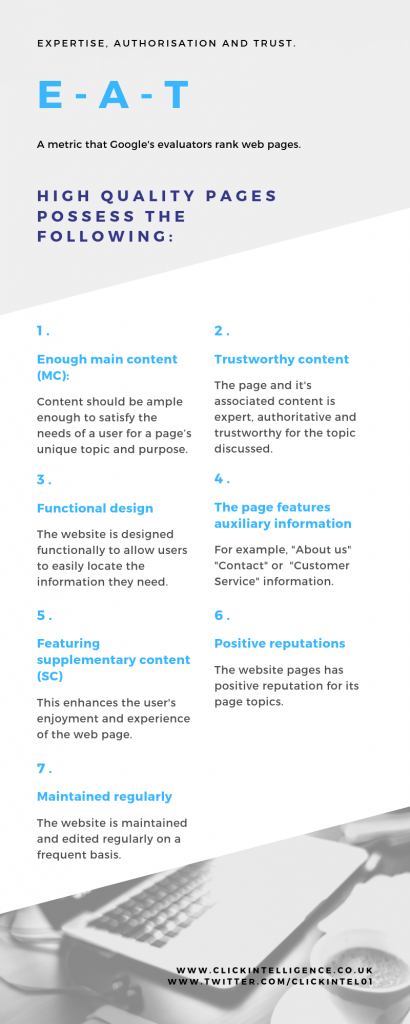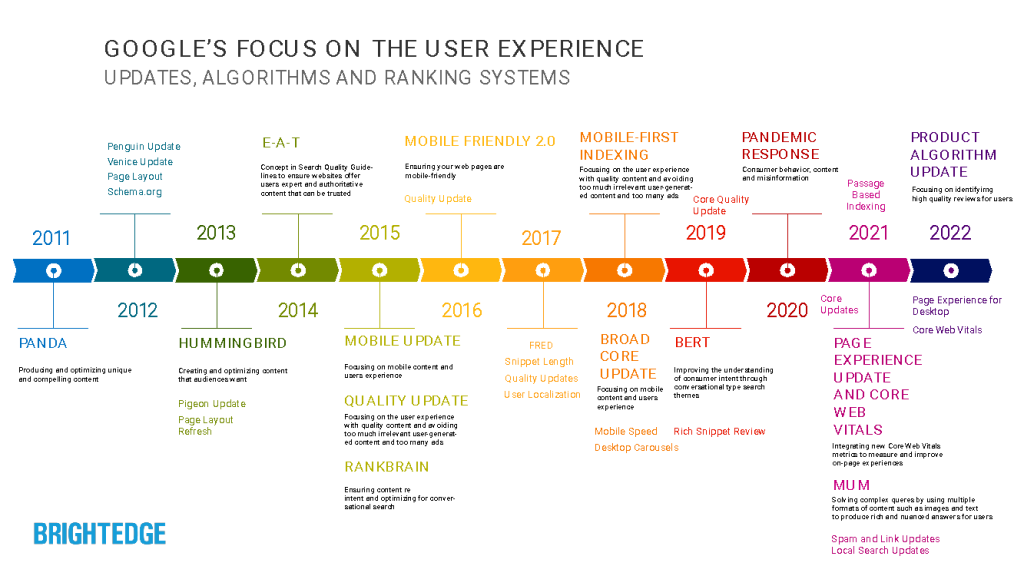Google core updates are updates to the Google core algorithm. They are a huge deal to website owners, as these significant algorithmic changes can impact a website’s search engine rankings.
Has a Google algorithm update affected your website’s search visibility? Are you worried about any upcoming updates and want to prepare for them as much as you can? If so, you’re in the right place, as we are SEO experts here at Click Intelligence. In this guide, we will cover:
- How the Google algorithm works
- The frequency of Google core updates
- The purpose of Google core updates
- Recent Google core changes
- How to keep your rankings over time
Understanding Google Core Updates
Google core updates are regular and significant updates made by Google with the goal of improving search results for users. Google wants to deliver genuinely helpful results to any user using the search query bar, and these updates help them do just that. It’s all about refinement and understanding the current content on the web.
It is important to note that Google core updates do not target specific websites or industries – they are very broad and focused on rewarding higher-quality pages and websites.
How Does the Google Algorithm Work?
 A lot of how Google works behind the scenes is still somewhat of a mystery – Google has over 200 ranking factors (the exact number is not publicly shared), and while some are well-known, others are kept hidden. Simply put, Google’s algorithm is a seriously complex system of many different algorithms working in unison to deliver the best possible results for users, and the core updates work towards achieving that.
A lot of how Google works behind the scenes is still somewhat of a mystery – Google has over 200 ranking factors (the exact number is not publicly shared), and while some are well-known, others are kept hidden. Simply put, Google’s algorithm is a seriously complex system of many different algorithms working in unison to deliver the best possible results for users, and the core updates work towards achieving that.
What we do know is that Google prioritises experience, expertise, authoritativeness, and trustworthiness, which is often referred to as E-E-A-T.
Experience
Google wants to know that the websites they rank the most have genuine experience – it’s one of the major quality raters. For example, if Google is ranking a review article, they will look for signs that the reviewer actually has experience using the product or service. Some key indicators of a site’s experience include customer reviews, travel guides with genuine and original photographs, and unique insights from an expert.
If you wanted to write a review about a skincare product to appeal to Google’s requirement of experience, you might document the process with photographs of your skin each day while using the product – this would show genuine experience and would therefore be more likely to rank higher.
Expertise
Expertise refers to credible knowledge from the website owner. Of course, this expertise should be specific to the field the website is in. For example, a money-saving website would have expertise in financial news and advice, whereas a beauty blog would show its expertise in skincare, makeup application techniques, and new beauty products on the market.
When looking at a website’s expertise, Google will focus on criteria like credentials, a demonstration of subject matter, external references, and certifications. Regularly publishing genuinely high-quality content on the subject is also enough to show Google that you are an expert in the field, especially when certifications and credentials are not relevant.
Authoritativeness
Authority matters a lot to Google, and it refers to a website’s credibility. The more credible a website, the higher Google will rank it in the results pages.
There are several ways to establish your website as more authoritative, and one of the big ones is acquiring backlinks from other authoritative websites. It also helps to have citations, press coverage, and general mentions from industry leaders.
Trustworthiness
Last but definitely not least is trustworthiness, the most crucial element in Google’s ranking factors. Google wants to know that a website is trustworthy – that the information is based on fact, that the site itself is secure, and that the reviews/recommendations are fair and balanced.
To establish trust, a website could include a transparent contact page, have a clear privacy policy, engage in open communication with users, and always place importance on factual, accurate information. If a mistake is made, the website should then release a statement correcting themselves and being honest about it.
How Often Does Google Update its Algorithm?
Google updates its algorithm literally hundreds of times per year, close to between 500 and 600 times – so that equates to over one a day!
However, that does not refer to Google core updates, which are bigger updates that Google speak publicly about. Google core algorithm updates occur just a few times per year, often with at least a few months in between each one.
Some of the Recent Google Algorithm Changes
To understand any potential upcoming Google SEO updates, it helps to know the ones from the past, so here are some of the biggest core updates Google has come out with over the years.
May 2022 Core Update
One major core update from Google occurred in May 2022, which they announced on Twitter (now X). It was pretty significant and focused on rewarding higher quality content, focusing on expertise, authoritativeness, and trustworthiness (E-A-T).
October 2023 Core Update
Another massive core update was announced in October 2023, which was completed by October 19. This one greatly improved search quality by focusing more on ranking high-quality, trustworthy content on Google.
March 2024 Core Update
The March 2024 core update is often cited as the most significant one to occur since Google started rolling them out. The goals here were to reduce low-quality content, address spammy tactics, and reward genuinely helpful content. The change was felt everywhere, as there was a 45% reduction in unhelpful content following this update.
Of course, keep in mind there have been updates other than the core ones, for example, on July 26, 2021. Google wanted to target spammy links, which basically means any website using untoward link tactics to climb the ranks. They addressed this in the Google Link Spam Algorithm update in the summer of 2021, which was rolled out a few weeks afterwards and had a major impact on rankings. There have also been several spam updates, which involve Google targeting spammy, poor-quality content.
Why Do Google Core Algorithm Updates Matter to Businesses?
So, why do Google algorithm updates matter? Three words: search engine optimisation (SEO).
SEO is the process of refining a website and its pages to appeal more to search engines, with the ultimate goal of climbing the ranks and becoming more visible to an audience.
Google core updates are essential to search engine optimisation updates, and these SEO updates have a significant impact on a website’s organic traffic. There’s often a major shift in search visibility (especially if your website no longer aligns with Google’s criteria), which means fewer people can find your business. As a result, there is decreased revenue. The stakes are high.
What to Do if a Google Core Update Shakes Your Rankings
Firstly, do not panic. It is always a stressful time for businesses after a Google core update has shifted their rankings, but remember, many other websites are in the same boat, and there are ways to mitigate the outcome.
Panicking can lead to overreacting, which may harm your rankings even further, so avoid this. Instead, wait at least a week, and then look at the data on Google Search Console, as this will show your performance. You can then compare your overall ranking performance before and after the update. This also gives you a chance to see which exact pages and keywords have been affected the most, and with this crucial information, you can adapt your SEO strategy.
Best Practices for a Long-Term Google Ranking Strategy
Your main goal should be not to be massively impacted by Google SEO updates at all, and the good news is there are ways to manage that.
Maintaining high Google rankings means avoiding drastically updating SEO strategies at Google’s whim. Instead, it means creating a sustainable, long-term approach that adheres to Google’s core ranking factors: experience, expertise, authoritativeness, and trustworthiness. Here are some ways to manage that:
- Create genuinely helpful content
- Aim content at humans, not algorithms
- Focus on originality and value
- Optimise your site for Core Web Vitals
- Ensure your website is mobile friendly
- Keep up a good website speed
- Choose quality links over a high quantity
- Monitor and track your seo performance, adapting strategies as you need to
With these practices, any changes to the Google core ranking algorithm should not massively hit you. Google wants to rank genuinely high-quality content first, so if you focus on that, you should be fine in the long run.
How to Stay Up to Date with Google’s Changing Algorithms
For any business, staying up to date with Google’s changing algorithms is a must. So, how do you do that?
- Read Google’s Official Sources: For the most reliable sources, check out Google’s own blogs and pages. That could mean following Google on X, looking at the Google Search Status Board, watching Google’s YouTube Channel, or reading the Google Search Central Blog.
- Read Reputable SEO News: There are many great SEO experts out there who can keep you in the know regarding Google’s algorithmic shifts. It helps to read these alongside Google’s official sources, as the SEO community often delivers even more in-depth insights into the changes.
- Use Tracking Tools: You can see exactly how Google’s core updates affect your website by using tracking tools. These will almost act like a weather report for your website, showing when there are spikes in volatility. Tracking these signals really helps keep you in the know.
What is Google Core Algorithm? Final Thoughts
The changing algorithm for Google is a way to ensure only high-quality content and trustworthy websites appear at the top of the search engine’s results pages, which creates a better user experience.
Of course, any Google algorithm core update is going to scare website owners, as it potentially means a shift in rankings – this can be hard to swallow, especially if you have spent a lot of time and effort climbing the rankings.
When Google updates SEO ranking factors, it’s up to you to learn about the shift and adapt as you need to. However, it is even more important to factor in Google’s core criteria and adopt strategies to adhere to that, as this leads to rankings that stand the test of time.
Need Help Staying Atop the Google Rankings?
If you want to stay in the know about Google algorithm updates, we release guides detailing all of Google’s changes as soon as we learn about them. We take information gathered by our own expert SEO team and combine that with insights from other industry leaders to keep our readers and clients up to date with Google’s ever-changing ranking factors and algorithm.
Plus, we use those insights to create targeted, custom SEO services for clients, helping them stay on top of Google search any time of the year. If you are ready to climb the ranks and keep your position, schedule a free consultation with our friendly team today!

